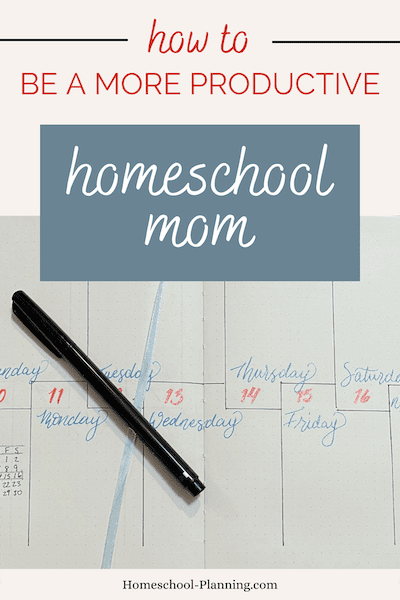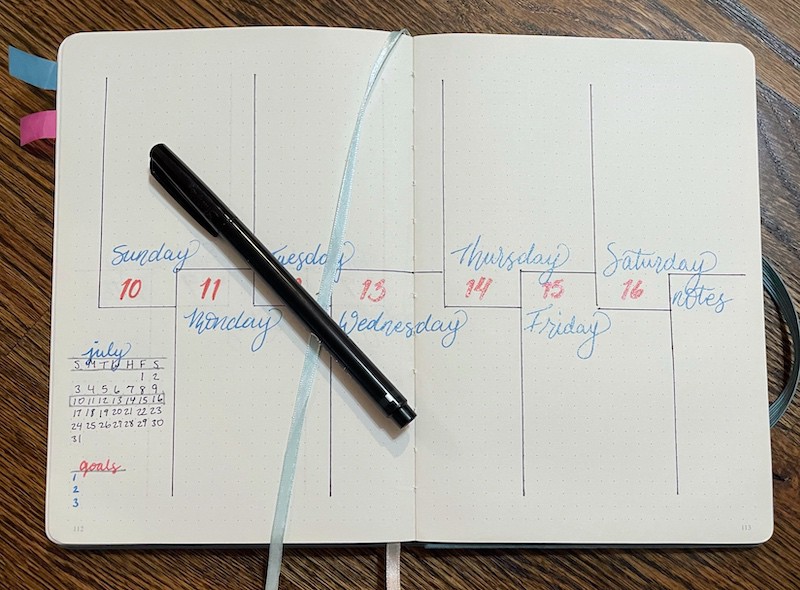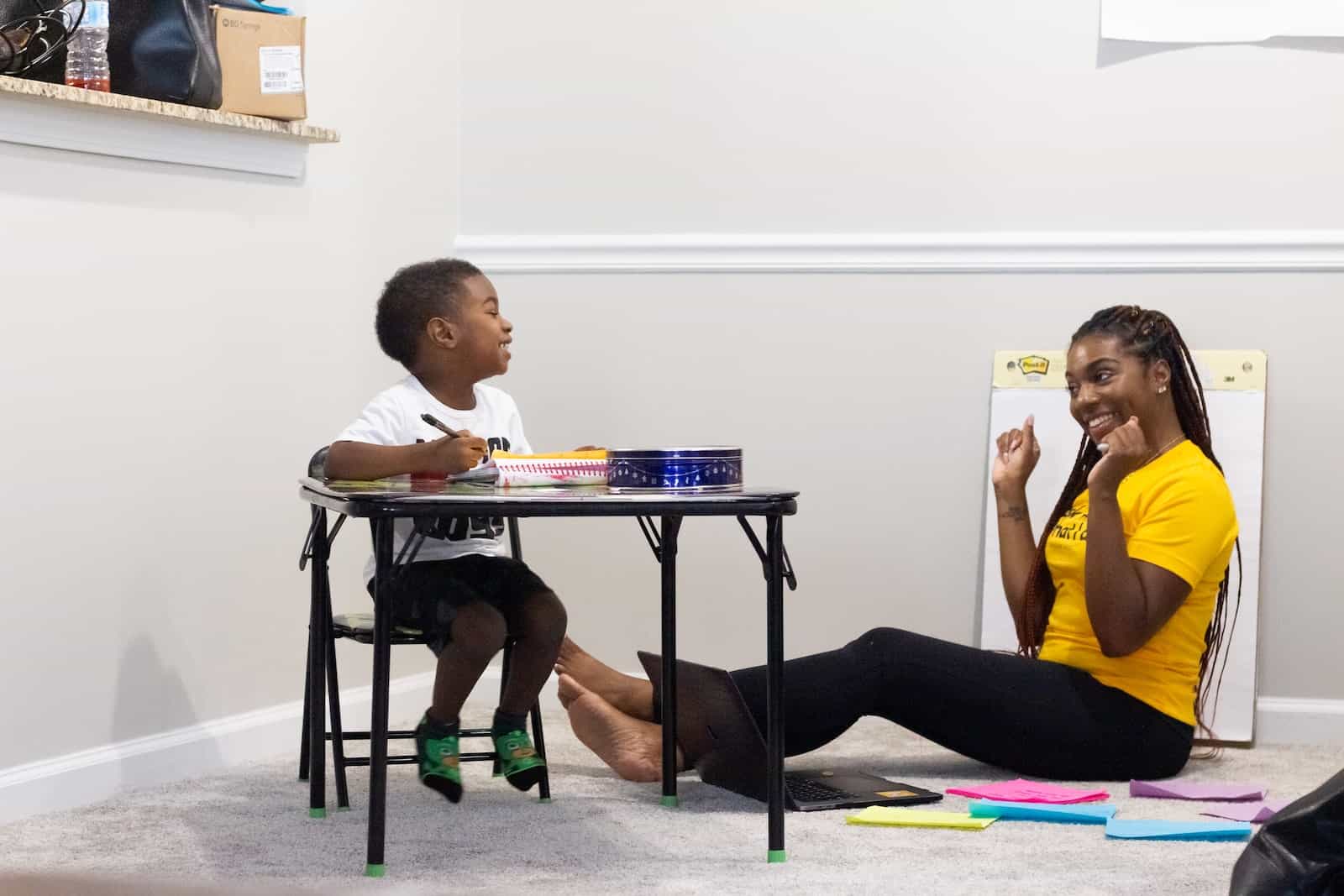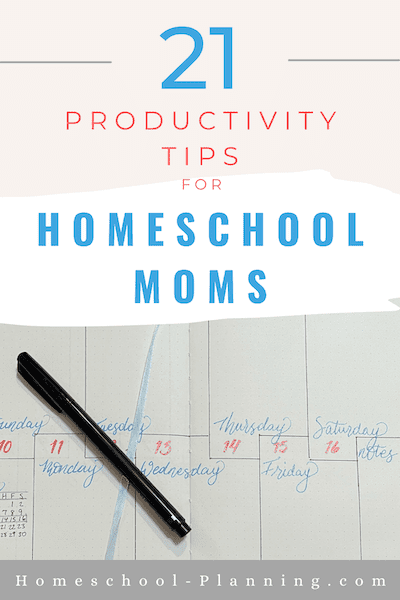This post is all about productivity tips for you, homeschool mom.
Do you have things you want to get done and dreams to pursue? Have you always wanted to write a book or start a side hustle? Are you a baker or love to do art and can never find the time anymore to pursue your own interests?
Maybe you can never find the time for the basic things you need to get done every day. We carry so much and often try to do it all. It’s hard to feel like we’re being productive.
This post is for you.
Here are some productivity tips I’ve found and started implementing myself to pursue my goals along with homeschooling my children.

21 Productivity Tips for Homeschool Moms
Homeschool moms have dreams, desires, and goals just like any person. It’s so easy to get so wrapped up in our children that we can never find time to produce anything on our own.
So here are my 18 productivity tips in no particular order to help you accomplish a bit more in your days.
1. Make small changes you can stick with
In Atomic Habits by James Clear, one of the most helpful productivity tips is to make small changes you can stick with. When you have a glaring problem in your life, it can be tempting to upend all the things you do and make drastic changes.
Go to the gym every day, change your diet, read more books, and somewhere in there still homeschool your kids.
But making small changes to your daily habits, you are more likely to stick things out when it gets hard. And small changes done every day for weeks can lead to big changes!
Say you want to read aloud to your kids every day, but it’s just one more thing on your to-do list.
So instead of trying to commit to reading for an hour every evening so you can finish a book in a week or two, start with 10 minutes every day. It may take longer to get through a book, but it’s a lot easier to find 10 minutes in your day than 1 hour. You are more likely to stick with it and finish that book and maybe two more by the end of the year.
So make a small diet change, go for a walk every morning, or read for 10 minutes each day. It’s the small things!
“Changes that seem small and unimportant at first will compound and turn into remarkable results if you’re willing to stick with them for years.”
James Clear, Atomic Habits
2. Remember your goals
You’ve probably heard over and over to remember your goals. But there’s a reason it is talked about so much. As Zig Ziglar has said, “If you aim at nothing, you’ll hit it every time.”
So choose the goals you have for your life. Make them achievable. Make them actionable. And come up with a plan to get there. And when going after that goal gets hard – as you know it will – remember that goal. And why you want to achieve it!
“Unless you have definite, precise, clearly set goals, you are not going to realize the maximum potential that lies within you.”
Zig Ziglar
3. Use fixed decisions
Using fixed decisions is a revolutionary productivity tip from Kendra Adachi’s book The Lazy Genius Way. She summarizes the idea quite well:
“Decide once, on purpose, about everything, from the items in your closet to what’s on your calendar. A single, intentional decision relieves your brain of effort, freeing you to think about what matters to you instead of living in a cycle of choosing this and that over and over again.”
Kendra Adachi, The Lazy Genius Way
So make a decision one time and stick to it. It’s fixed, stuck, non-movable. You can’t change your mind cause you already decided.
I think this strategy is particularly helpful if you:
- are easily swayed
- struggle with decisions
- are always changing your mind
- find time being wasted on things you didn’t plan
Your decision could be deciding on a math book and keeping it all year. Or deciding that you will do school every weekday no matter what.
Maybe it’s deciding that for Christmas all the kids are getting the 4 category gifts: Something they want, something they need, something to wear, something to read. Perhaps you will have tacos every Tuesday for dinner and pizza every Friday night.
You can use this for:
- curriculum
- schedules and routines
- meals
- lesson plans
- presents
- clothing
- So many other things!
This has been a big help to me. I have always had trouble with decisions and tend to second guess myself.
So when I’ve started wondering if I chose the right science curriculum, I tell myself, “It’s what I chose so it’s what we’re using.” And I will adjust it if needed, but I have decided I won’t switch it out.
Decide once, on purpose, about everything, from the items in your closet to what’s on your calendar. A single, intentional decision relieves your brain of effort, freeing you to think about what matters to you instead of living in a cycle of choosing this and that over and over again.”
Kendra Adachi, The Lazy Genius Way

4. Focus on the next thing
Focusing on the next thing in front of me can be hard. Sometimes I can get so overwhelmed looking at the big picture of all that needs to get done, that I can’t even figure out how to get started. There’s just so much!
It has been wisely said that “there is only one way to eat an elephant: a bite at a time.”
Remember to break all big tasks and goals down into manageable “bite-size” pieces. This will help you have a good plan to meet your goal, but also easy steps to get there.
Then instead of looking at the big picture, focus in on the next “bite” in front of you. It’s the only way to get to the end goal.
There is only one way to eat an elephant: a bite at a time.”
Desmond Tutu
5. Start your task before you can talk yourself out of it
I was listening to a seemingly unrelated podcast episode of The Read Aloud Revival with Sarah Mackenzie when a life-changing comment was made. It’s episode #210 where Sarah discusses her new publishing company for children’s books called Waxwing Books. In it she discusses how the company came to be.
She mentions how an off-hand comment in an interview with children’s author Kate Dicamillo took her off guard. It seemed to affect Sarah and astounded me as well. Kate mentions how she writes every morning. She says,
“I go in and do two pages and I do the two pages before the interior voice that says, ‘You don’t know what you’re doing’ – the critic is how I think of it – before that voice wakes up. And so then the most important part of the day is done before I can talk myself out of doing it.”
It’s really not an extraordinary productivity tip, but I have since found that I talk myself out of doing things all day long. Making excuses.
So now, when there is something I am trying to work on, I have been trying to turn off the internal monologue and just do it. Before the excuses can kick in. There’s no “I’m not good enough,” “why am I doing this,” “my kids don’t like school anyways,” “what’s one day off,” “we’ll just skip this subject.”
Maybe Nike said it first, but their slogan never hit me quite like this. So before those voices in your head wake up, go do the thing!
“I go in and do two pages and I do the two pages before the interior voice that says, ‘You don’t know what you’re doing’ – the critic is how I think of it – before that voice wakes up. And so then the most important part of the day is done before I can talk myself out of doing it.”
interview with Kate Dicamillo on the Read Aloud Revival Podcast, episode #210

6. Take time off
Taking days of rest are rooted throughout history. In Judeo-Christian tradition, the idea of a Sabbath is held. A similar idea is found in other religions as well.
It is also found in Habit 7 of The 7 Habits of Highly Effective People where Stephen R. Covey discusses self-renewal in 4 key areas: body, heart, mind, and spirit.
Many scientific studies have found that rest helps with mental clarity and productivity. Somehow allowing yourself to relax and taking some time off actually helps you do better during the more active times in life.
Not only should you take regular days off, but you should ensure you are getting plenty of sleep. It will help your body to replenish and also help prevent sickness.
I’ve heard it said that if you don’t take regular time off, then your body will force you to. This often comes through sickness.
Another approach to get days off is to work in some special scheduling hacks for your homeschool. This could help you accomplish other tasks on those “days off.”
Many homeschoolers will do school 5 days a week for about 6 weeks, then take the following week off. This is often referred to as a sabbath school schedule. Other homeschoolers will do school only 4 days a week. You could also school year round and take days off when needed.
Just find ways to rest and actually do it.
For more ideas on schedule ideas, check out my post on attendance planning.
Rest is not idle, is not wasteful. Sometimes rest is the most productive thing you can do for body and soul.”
Erica Layne
7. Commit to 2 minutes
Sometimes the hardest part of doing anything is starting. And that’s where this productivity tip comes from. All you have to do is decide to do something for 2 minutes. So if you’re wanting to start walking daily, this may only mean you commit to putting on your shoes.
James Clear speaks of this idea in his book Atomic Habits. I’ve heard similar ideas in other books as well.
So the reason this is helpful is that after those first few minutes, it is easier to continue. You are faced with another decision. Continuing toward your new goal is easier with the first tasks already completed.
Open up the computer to start writing. Get out the book to read to your kids. Set up your paintbrushes. The hardest part is done. Will you continue?
The truth is, a habit must be established before it can be improved. If you can’t learn the basic skill of showing up, then you have little hope of mastering the finer details.”
James Clear, Atomic Habits
8. Use good tools to help you
A woodworker needs a good saw. A cook needs good pots and pans. A florist needs good clippers. What does a mom need? What about a homeschool mom? A writer, an artist, an author?
If you’re trying to get better at any role, it is helpful to use good tools. Not only can something new make you want to use it, but even after the newness fades, a specific and good quality tool can make your productivity soar.
A woodworker using a dull saw blade or the wrong type of saw can slow everything down. A chef using old beat up pans that food sticks to will always struggle.
So find the tool that will help you. If you are able, buy the best pens and the nice paintbrushes. Get a better computer. Buy a new notebook. Get the curriculum you want.
And every homeschool mom needs a good planner!
The best investment is in the tools of one’s own trade.”
Benjamin Franklin

9. Reward yourself
James Clear promotes the idea of “temptation bundling” in chapter 8 of his book, Atomic Habits. Here’s the basic idea in his words, “Temptation bundling works by linking an action you want to do with an action you need do.“
Perhaps you love watching a certain TV show. But you are always behind on your laundry. So you could link the two by allowing yourself to only watch your TV show while you are folding the laundry.
Or you could reward yourself after the difficult task. If you have a habit of checking social media but you need to get some writing done, you could write for 30 minutes, then allow yourself to look at social media afterwards. This is similar to a portion of the pomodoro method.
This productivity tip can help you to eventually even look forward to those difficult tasks. In a basic sense you are conditioning your response, just like Pavlov’s dog. Make yourself like the hard stuff because of the good stuff it’s linked to. It’s an innate behavior in humans, why not utilize it?
Temptation bundling offers a simple way to accomplish these tasks that are always important, but never feel urgent. By using your guilty pleasures pull you in, you make it easier to follow through on more difficult habits that pay off in the long-run.”
James Clear, Atomic Habits
10. Use time blocking (at good times for you)
Every season of life is different and it’s important to understand that it’s ok to make a change. Experiment with times that you can be most productive.
Growing up, I was a night owl. I spent many a night writing papers at 2 am in college. I was very productive after dark.
When I had a baby in the house, I was always tired. My productive times were nearly non-existent. But when I was productive, it was usually during nap time. And I definitely went to bed as soon as I could at night.
Now that my youngest is 5, I have found I have more flexibility again with my productive times. But by the time evening comes around I’m pretty done. So I have started to get up early in the morning and I can usually get an hour or so of productive time before the kids are awake.
When you have figured out your productive times, you can use a method of time management called time blocking to be more productive. You may also call it block scheduling.
The basic idea is that rather than switching between many different tasks throughout your day, you carve out larger amounts of time for specific tasks. This allows deeper focus on specific tasks, helps you to be more productive, and less distracted moving from task to task to task.
For instance, I set aside our weekday mornings for homeschool. Our afternoons are for appointments and errands. If we are home in the afternoon, we do chores and have free time. I work on blog stuff before breakfast and afternoons when we don’t have other plans.
By guarding these blocks of time for specific tasks, it helps me to be sure we keep our priorities and don’t overcommit.
We are what we repeatedly do. Excellence, therefore, is not an act but a habit.”
Aristotle

11. Make a short to-do list each day (7 items or less)
To-do lists are great tools to help us keep track and prioritize what needs to be done with our time.
Damon Zahariades states in his book The Procrastination Cure that it is best to keep our list no longer than 7 bigger tasks to keep the list from being overwhelming. You may even find that you need a shorter to do list than 7. Maybe 3 is a good number for you.
Keeping our list short helps us to prioritize things that matter. When only including a handful of things, we often have to choose what is most important to us.
“Your task list isn’t a tool for getting everything done. Rather, it’s a tool that will ensure you get the right things done. It’s important to understand the difference.”
Damon Zahariades
12. Eliminate distractions
We live in a day and age where everything around us is fighting for our attention. It is work in itself to eliminate distractions and focus on productivity. But YOU have the control of where you focus your mind.
Studies show that when distracted, you may or may not see a big difference in the time things take to complete, but you will definitely see a difference in your stress level and frustrations.
So turn off the phone, use your computer offline, lock yourself in a quiet room. Do what it takes to give yourself a few uninterrupted moments. Harder said than done as a mother, I know.
While you can do your best to eliminate distractions, sometimes it’s impossible with kids. So ultimately, don’t wait for the perfect moment to come for inspiration. Remember that something is better than nothing. So even if it’s 10 minutes distraction free, that’s a step in the right direction.
At times the whole world seems to be in conspiracy to importune you with emphatic trifles. Friend, client, child, sickness, fear, want, charity, all knock at once at thy closet door and say,—’Come out unto us.’ But keep thy state; come not into their confusion. The power men possess to annoy me I give them by a weak curiosity. No man can come near me but through my act.”
Ralph Waldo Emerson, Essays of Ralph Waldo Emerson
13. Learn task batching
Task batching is a large force toward better productivity. This means that you group together, or batch, the tasks on your to-do list that are similar. Then work on these tasks within the same time frame. This helps you to work within the same mental space in that time period.
For instance, if you had 5 phone calls to make, you could spread them out throughout your day, or you could take 30 minutes and do them all.
You need to look over your kids assignments from the day. You could look over each page as your child finishes, or you could wait until they are finished with all the pages then look over them at once.
It takes time to switch between types of tasks, so why not stay “in the zone” and knock them out at once?
You can group tasks that are similar topics like work, homeschool, or health. Or by types of tasks like emails, phone calls, housework, or all the things you need to do online.
You could also batch them by difficulty level, trying to knock out all the quick and easy tasks of your day first so you can focus on the bigger, more difficult tasks later.
Some ideas for task batching as a homeschool mom:
- Grading
- Planning
- Meal menus
- Shopping
- Appointments
- Errands
- Cleaning
- Meal prep
- Cooking
- Communication (phone calls, emails, etc.)
Productivity is never an accident. It is always the result of a commitment to excellence, intelligent planning, and focused effort.”
Paul J. Meyer

14. Create a routine or rhythm for your day and write it down
Creating a rhythm or routine is helpful to streamline your day. It also helps to lower stress and anxiety as you know what is happening next. Routines also help free your head space. When you aren’t focusing on the mundane details of your life, you are able to focus on more complex tasks.
Creating a rhythm for your day can help you to more easily implement small changes into your life, work toward goals, and maximize your time. You can create daily habits that include these things.
Consistent sleep times also help you to be more productive as your body knows what to expect. You end up sleeping better and longer. Consistency with sleep is also proven to help lower risk of disease.
Notice I am saying routines or rhythms. For many, schedules that are linked with times can be quite helpful. For others, they are inhibiting and overwhelming.
Either way, using a flow, routine, or daily rhythm that is associated with general times of day might make all the difference. Think morning routine, afternoon routine, evening routine….with a general flow to your day.
It is also a known fact that putting plans in writing help us to be more successful. So, especially if starting something new, be brave and write down your plans. You can always change them.
You will never change your life until you change something you do daily. The secret of your success is found in your daily routine.”
John C. Maxwell
15. Do things you enjoy
We all want to do things we enjoy. You always look forward to those things. If you look forward to it, you are more likely to follow through and do it. So choosing to do more things you enjoy is a great choice if looking for a new hobby, side hustle, or even a new curriculum!
Here is a sticking point. You can choose to do only things you enjoy, but even enjoyable things eventually can become work. So the goal is to choose something you know you will stick with even if it becomes less enjoyable over time.
Homeschooling your children is just this. Some days it is lovely. The birds are singing and everyone is happily spouting off their math facts. Other days, you are just trying to get through it. But in the end, you wouldn’t change it, because it’s worth putting up with the hard days to get the good.
If you are trying to start a side hustle or begin a new hobby, be sure it is something that you not only enjoy, but something you will be willing to dive into further even when the waves are rough.
You can also try to make the difficult more bearable by turning less enjoyable tasks into something more fun. Turn it into a game or link it to something else you like.
Turn on music while you sweep the floor. Listen to an audiobook while you fold the laundry. Do schoolwork outside in the sunshine.
Your work is going to fill a large part of your life, and the only way to be truly satisfied is to do what you believe is great work. And the only way to do great work is to love what you do.”
Steve Jobs

16. Leave margin in your day
Margin on a piece of paper is the white space around the writing. It helps our brains to better focus on the writing on the page, as well as allows a little wiggle room for editing and changes. The same can be true about your day.
If you schedule your whole day down to the minute, more likely than not, you will end your day frustrated. No matter how positive you try to be, everything always ends up taking longer than you expect. This is where leaving some margin in your day is helpful.
The new math lesson is difficult and takes longer than expected. Susie woke up with an attitude and has seemingly forgotten how to write anything. The science experiment has failed. The internet is slow. And ugh, I can’t find that book anywhere!
This is the reality of homeschooling real children. And it’s really mostly about our expectations.
Sarah Mackenzie from Read Aloud Revival suggests to only schedule 80% of your time allotted. If you have 3 hours set aside for schoolwork, consider only planning 2.5 hours of schoolwork. Or keep the 3 hours worth and set aside an extra hour of flex time for margin.
There’s another aspect to this though. In 1955, a British historian named Cyril Northcote Parkinson stated what became known as Parkinson’s Law: “work expands so as to fill the time available for its completion”.
This is where the idea of always cleaning right before your guests arrive comes from. You know you have the time, so you’ll fill it.
Somewhere between the schedule, the margin, and the expansion is a happy balance that will work for your family. The goal is to allow for it all and adjust your expectations accordingly.
Margin is having the pace and space in your day to allow real life to happen. Too many of us run at a pace that is not only unhealthy physically but damaging relationally. We go-go-go, telling ourselves there are just not enough hours in the day, when we really need to be slowing down and enjoying the journey just as much as we anticipate enjoying the destination when we arrive.”
Jill Savage, author
17. Prioritize essentials – eliminate busy work
Prioritization is one of the most important yet difficult aspects of productivity. If you spend all your time on things that aren’t important, then you will never progress. But much of the time it’s hard to decide what you should prioritize.
Stephen Covey suggests in his book The 7 Habits of Highly Effective People to prioritize based on two main things: urgency and importance. The things that are both urgent and important, should of course get priority.
As homeschool moms it’s tempting to think everything is both important and urgent when it comes to caring for and teaching our children. But most things are neither when it really comes down to it. We’re playing the long game here.
Relationships, love, food, shelter….those things are pretty important and should always be prioritized.
Take a step back and focus on what your overall goals are for your children and use that as a guide for proceeding and prioritizing. If the task helps you toward those goals, it is important.
Ultimately, it’s up to do you to decide what is important and prioritize those things in your life.
It’s also helpful to pare things down a bit. Delegate what you can, simplify and combine where possible, and remove what is unnecessary. Avoid busywork that is just a time filler.
And one more thing. Unstructured time, especially outdoors is helpful for your children. Free time and play are not a waste, they are some of the most important work children can do. So if given an option, opt for that over more bookwork.
Putting first things first means organizing and executing around your most important priorities. It is living and being driven by the principles you value most, not by the agendas and forces surrounding you.”
Dr. Stephen R. Covey, 7 Habits of Highly Effective People
18. Try not to multitask
You may think that doing multiple things at once helps you get multiple things done quickly. But the truth is that most people are not able to do either task as well when their attention is split.
As moms, it can be tempting to multitask constantly. Sometimes this is good and sometimes this is harmful.
I see myself do this a lot while homeschooling. I am waiting for my daughter to work a math problem so I start planning out my to-do list. Next thing I know, I’m ignoring my daughter. I’m not truly doing things simultaneously, but rather switching between the two. This leads to inefficiency and my daughter’s hurt feelings.
When doing important work like homeschooling your children, try to focus on one thing or child at a time.
Ask your other children to wait until you are finished with one child’s question before helping another. It’s good practice for them to wait their turn. It also helps them to know they get your full attention at times.
You can do two things at once, but you can’t focus effectively on two things at once.”
Gary Keller

19. Read good books
Read good books. I know, I know. You’re thinking, “but when do you find the time? Aren’t we trying to streamline our tasks to do more of what we want, not adding more to our lists?”
Stick with me for a minute.
You may have noticed many of the tips on this list have actually come from books! Reading books not only helps you mentally by improving your focus and cognitive skills. It also is a great way to relax as well as learn.
If you are trying to get better at something, read a book about it! If you need to relax, read a book you love.
This isn’t about adding more to your plate, it’s about remembering that books aren’t just for kids. Books can widen our world. They help us learn new things about other people and other things.
And you don’t have to only sit and read a physical book. There are audiobooks, e-readers and more! Remember the other tips you’ve already read and start with 10 minutes or perhaps just 10 pages. Focus on starting and make the one small change.
“The more that you read, the more things you will know. The more that you learn, the more places you’ll go.”
Dr. Seuss, I Can Read With My Eyes Shut!
20. Use your down time
Use your down time to be more productive. You know, all those moments where you may be tempted to pick up your phone and mindlessly scroll social media.
- Laying in bed
- In the bathroom
- In line
- In the waiting room
- While food cooks
- During extracurriculars
Instead, have a book ready on your phone. Listen to a podcast. Open that instead of social media. Or bring a notebook, planner, or even your laptop to the doctor’s office and do some work while you wait.
Perhaps you are creating an online presence and you could use this time to make social media posts. You could answer comments or emails. This is a great time to look over schoolwork, next week’s plans, or create a shopping list.
Decide in advance (fixed decision!) that you will do something different with your time and not mindlessly let it slip away.
Time is what we want most but what we use worst.”
William Penn
21. Delegate what you can
There’s no new revolutionary tips for productivity here. You know you can’t do it all. So don’t. And don’t feel guilty about it.
If you’ve already pared down everything you have on your plate but are still overwhelmed, delegating is a good direction to focus.
Children are incredible helpers if you allow them to be. Teaching them to do age appropriate tasks can help you in the long run and build important skills for them!
It’s work in the beginning but gives a huge pay out later. It won’t always be done exactly how you wish and that’s ok. Breathe.
Also consider talking with your husband or other adults around you about ways they could take off some duties. Perhaps your mom could come help with the laundry once a week, or you could have dinner with your in-laws every Monday.
Don’t forget about services that will do the grocery shopping for you. And online classes, tutors, and coops work great for delegating some of the more difficult school subjects. Hiring a housekeeper, even once a month, can be a huge help.
Things you may consider to delegate as a homeschool mom:
- Cooking
- Laundry
- Cleaning
- Shopping
- Grading schoolwork
- Helping with a school subject
- Accounting
- Driving kids to activities
- Watching the littles
- Caring for animals
- Yardwork
For more thoughts on delegating chores around the house, read my post about Household Chores made easy.
If you want to do a few small things right, do them yourself. If you want to do great things and make a big impact, learn to delegate.”
John C. Maxwell
Closing
With so much on our plates as homeschool moms, sometimes it feels impossible to do it all. I hope this article has helped you see there are many productivity tips you can implement today to keep moving forward. Start with small changes, align your focus, and don’t forget to delegate! You’ve got this, mama.
Do you have any productivity tips that you feel have saved your time as a homeschool mom? Share with us below!
Related Posts
Homeschool schedule hacks that can change your homeschool
Am I failing at homeschooling?
Create a homeschool plan for your year
Ultimate guide to schedules and attendance in your homeschool











